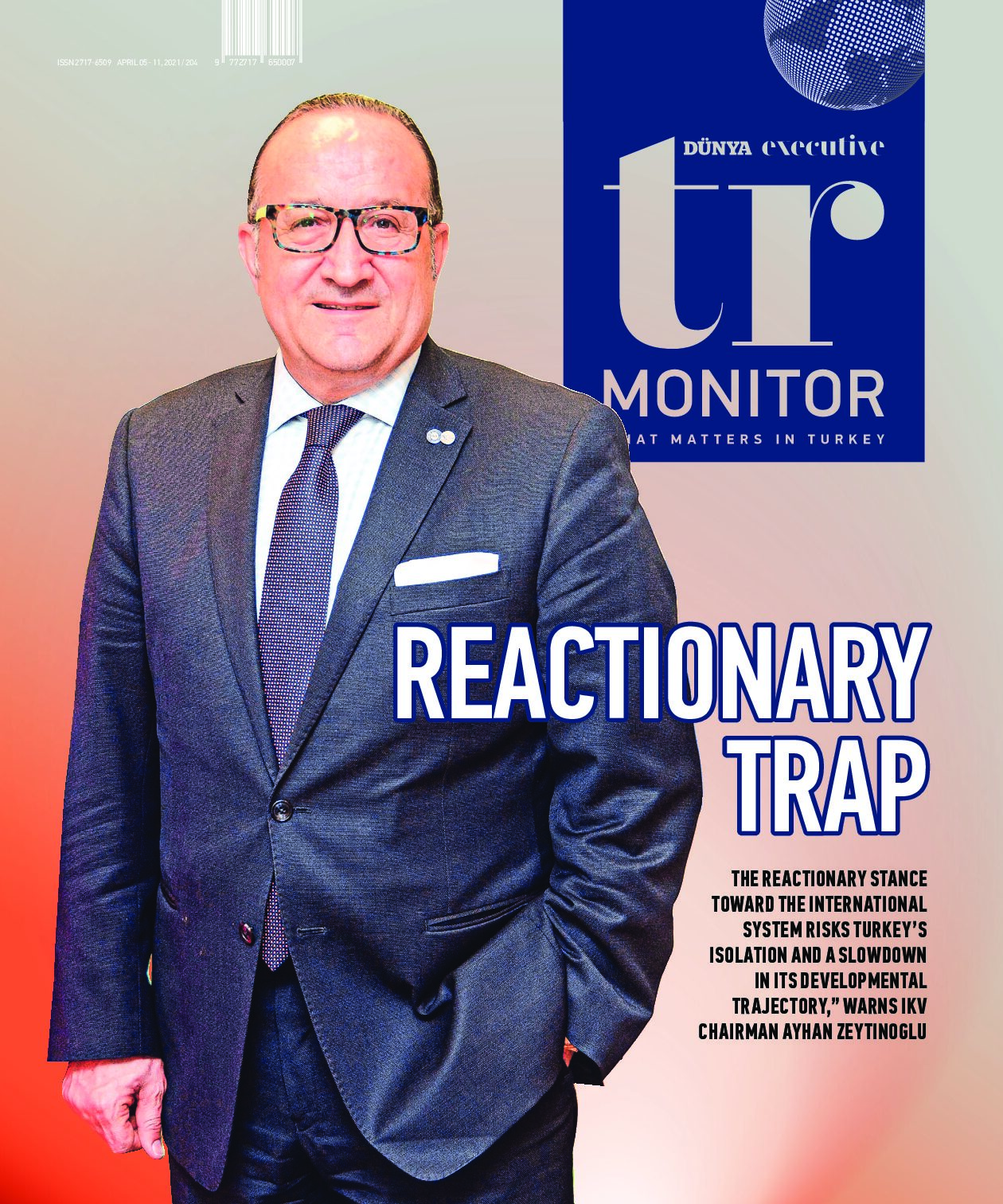“THE REACTIONARY STANCE TOWARD THE INTERNATIONAL SYSTEM WE’VE SEEN FROM THE GOVERNMENT AFTER ITS WITHDRAWAL FROM THE ISTANBUL CONVENTION, ITS DECISION NOT TO RATIFY THE PARIS AGREEMENT AND NOT IMPLEMENT THE DECISIONS OF THE EUROPEAN COURT OF HUMAN RIGHTS, RISKS TURKEY’S ISOLATION AND A SLOWDOWN IN ITS DEVELOPMENTAL TRAJECTORY,” SAYS IKV CHAIRMAN AYHAN ZEYTINOGLU
THE WEIGHT OF A CRITICISM comes not only from its internal logic but also from who is leveling it. To argue, for instance, that reactionary politics is detrimental to a country’s political development sounds rather ordinary, but when it is Ayhan Zeytinoglu, the Chairman of the Economic Development Foundation (IKV ) leveling it, the criticism takes on an extra layer of gravitas.
Since it was established in 1965, the IKV has been the key private sector institution involved in Turkey’s EU membership process. over the years, it has also undertaken the task of coordinating relations between the Turkish business world, the EU and the government in areas concerning Turkey-EU relations. So, when an IKV chairman speaks, his words carry the weight of a person who knows what it means to build relations and because the foundation plays such an important role in informing Turkish public opinion, especially the Turkish private sector, about the impacts of the accession process, it is always worth consulting the IKV, especially in times when relations are at a turning point, as they are today.
Zeytinoglu spoke to daily DUNYA editors Hakan Guldag, Vahap Munyar and Seref Oguz, about the current state of relations and their possible impacts on Turkey’s biggest trade partner.
Zeytinoglu began with the development of Turkey’s economic and political relations with the EU in the post-COVID period. COVID -19 launched a strategic autonomy and economic resilience push in the European Union (EU), Zeytinoglu said. “Searching for resilient supply chains and their diversification in regions geographically close to Europe has become important.”
The top priority for the IKV is to develop Turkey-EU relations in light of the shifting economic realities, he added. “We must build relations on orthodox and sustainable grounds in line with the full membership target and to diversify Turkey’s economic and political relations by keeping pace with global change and transformation.” Turkey’s integration with the EU is quite advanced, despite the current political issues, Zeytinoglu pointed out, which opens up opportunities. The achievements of the Customs Union (CU) and the membership process has led to Turkey revising its legislation in areas such as strengthening its manufacturing industry, attracting international investment, growing its market share and competitiveness, intellectual property, protection of personal data and consumer rights.
However, the stagnation in the Turkey-EU relationship, freezing of membership negotiations and hesitancy to update the CU have led to an unraveling of some of these achievements, he adds. “The reactionary stance toward the international system we’ve seen from the government after its withdrawal from the Istanbul Convention, its decision not to ratify the Paris Climate Accord and not implement the decisions of the European Court of Human Rights risks Turkey ’s isolation and a slowdown in its developmental trajectory.”
CAUTIOUS OPTIMISM FROM EU SUMMIT
The latest indicators emerging from last month’s EU Summit suggest there is room for improvement in the relationship, both in the economic and political arenas, particularly issues pertaining to the Eastern Mediterranean, Zeytinoglu said. He also emphasized the importance of developing relations with the EU based on its goal of transforming its economy in line with European Green Deal principles. Turkey must proceed with its reforms with this new future in mind if it wants to achieve its goal of full membership, Zeytinoglu cautioned.
“The conclusions from the EU Summit were met with cautious optimism,” he said. “We welcomed the call for de-escalation in the Eastern Mediterranean and the European Council made some recommendations to improve cooperation with Turkey. However, for these recommendations to become a reality depends on continued peace in the Eastern Mediterranean.”
SOLVING POLITICAL ISSUES POSSIBLE
Concerns over democracy, human rights and the rule of law remain key components of Turkey-EU relations and essential for the accession process, Zeytinoglu said. “Focusing on reforms in the economy and politics in Turkey by June will pave the way for a revitalization of relations with the EU. The European Council pushed for advancing the work toward an Eastern Mediterranean Conference, which was also proposed by Turkish President Recep Tayyip Erdogan.”
Moreover, a solution in Cyprus within the framework of the UN was mentioned, with the EU willing to participate in upcoming talks in April as an observer and provide support, he noted. Maintaining a moderate stance on Eastern Mediterranean and Aegean issues with these kinds of diplomatic initiatives will be beneficial for peace and security in the region, Zeytinoglu added.
“Turkey and the EU moving in tandem is of utmost importance for post-COVID-19 normalization, economic recovery, increasing foreign investments and the revival of trade,” he said. “We support close coordination and cooperation and coherent progress with Turkey on issues which are high on the EU agenda, namely the Green Deal and digitalization.”
‘GREEN’ CAN BE THE ‘DEAL’ IN TURKEY
The Green Deal highlights two key issues while also creating opportunities, Zeytinoglu said. One is to continue to increase exports by updating manufacturing practices in accordance with changing product standards to meet Green Deal targets. The second is addressing the pressures that will arise from the Carbon Border Adjustment (CBA) regulation put on the agenda by the EU to prevent carbon leakage. The creation of a carbon pricing mechanism similar to the EU’s Emission Trading System (ETS) is important for Turkey. “If we don’t comply with this, additional costs will make exports harder,” he says. However, if Turkey adapts the Green Deal quickly, it can gain some competitive advantage in the green economy, he added.
“We’re fortunate in terms of our access to renewable energy resources. We have an opportunity to become competitive in global markets by developing manufacturing and production processes in accordance with a sustainable and circular economy. We must gradually increase the share of renewables in energy resources.”
The Green Deal will also create an incentive to shift to Turkish manufacturing in the European value chain. Manufacturing will have to change in accordance with changing standards and production concepts in the EU market.
All companies and manufacturers should feel obligated to keep pace with this transformation. Beyond that, measures should be taken also at the state level, according to the IKV chairman.
TAPPING INTO GREEN RESOURCES
“First and foremost, comprehensive strategies should be developed for the ratification of the Paris Agreement and for achieving climate targets,” Zeytinoglu said. “Industrialists shouldn’t shoulder all the burden; the government should provide support in terms of direction and financing through channels such as the European Investment Bank. The EU allocated nearly EUR 1tr for transformations by 2030. Even if the majority of this fund is allocated to EU states, benefitting from these funds is possible for EU candidates and countries in the EU neighborhood.”
The EU market remains important for Turkey in terms of institutional links, standardization and geographic proximity, Zeytinoglu said.
All trading players shifted their focus to increasing and diversifying free trade agreements (FTAs) after multilateral trade negotiations came to a halt following the World Trade organization’s (WTO) Doha Round, he underlined. “We need to act with the EU in this direction. Simultaneous negotiations on FTAs with the EU can be on the agenda with the modernization of the Customs Union,” he pointed.
“WE SUPPORT THE NECESSARY STEPS TO INCREASE INVESTMENTS IN THE TRNC”
“The UN Cyprus summit in April is important for the resumption of talks toward a comprehensive settlement on the island after [the 2015-2017 talks in the Swiss town of] Crans-Montana. However, it is very important for the Greek Cypriot Administration of Southern Cyprus (GCA) to change its attitude in order for these negotiations to yield results. The fact that no solution has been reached on the basis of a federation so far supports the view of a two-state solution. Now, the two-state solution approach has gained more widespread support in both Turkey and the Turkish Republic of Northern Cyprus. The GCA is a European Union member and is able to influence the opinion of the EU; it uses this as a trump card against Turkey and the TRNC’s relations with the EU. They seem to negotiate, but they don’t actually want a solution, as we saw in their position in Crans-Montana. They will be at the summit in April, and their attitude will depend on the approach of the EU and the U.S. The EU has not used its weight to push for a solution in Cyprus so far and instead took a stance against a solution after the GCA became a member. It is difficult to see how this attitude will change in the short term. As the Turkish business world, we support the necessary steps to increase investments in the TRNC and to be recognized by the international community.”
INSTITUTIONAL RELATIONS RATHER THAN PERSONAL
“Biden has brought the U.S. back into the Paris Climate Agreement, expressing his wish for closer cooperation with the EU. After Trump, he again put democracy and human rights among the priorities of U.S. foreign policy. The EU also announced at the summit in December that it would co-ordinate with the U.S. on its Turkey policy. This shows that Turkey has to maintain its relations with the U.S. on an institutional level, unlike the personal level during the Trump era. The S-400 issue continues to be on the agenda and negatively affects the relationship. In addition, demands to address issues of democracy and human rights will only increase from both the U.S. and EU. Multilateralism should be the approach going forward. In this way, Turkey can work on closer cooperation with the EU on issues like World Trade Organization reform, combating climate change giving priority to diplomacy.”
“EUROCHAMBRES AND BUSINESS EUROPE SUPPORT MODERNIZATION OF CU”
“Customs Union modernization is one of the most immediate and implementable reforms in the current relations with the EU. The modernization of the CU is included in the EU’s agenda proposed in October. Negotiations will be possible with the implementation of this agenda. But Turkey should return to economic and political reforms in real terms, and to provide unity of discourse and action. All institutions in the Turkish business world and umbrella organizations in the EU, such as Eurochambres and Business Europe, support the modernization of the CU. However, political resistance should be overcome. Numerous third countries are taking advantage of the EU market with an increasing number of FTAs, which means increasing competition and a need to update relations with Turkey. The CU currently includes only industrial goods and processed agricultural products. But many other trade agreements have been modernized to include areas such as services, investments and public procurements. In this sense, the CU’s modernization is especially important.”
MORE THAN HALF A CENTURY OF EU EXPERTISE
The IKV was established on the initiative of the Istanbul Chamber of Commerce and Istanbul Chamber of Industry on November 26, 1965, two years after the entry into force of the Ankara Agreement, which kicked off the process of European integration and Turkey-EU relations. Since its establishment, the IKV has become an effective organization both in Turkey and in the EU through its publications, seminars, lobbying activities and close cooperation with foreign and domestic institutions. The IKV Brussels Office has been in charge of relations with EU institutions since 1984. The IKV is also supported by trustees representing the business world and sectors such as the Union of Chambers and Commodity Exchanges of Turkey (TOBB), Turkish Exporters Assembly (TIM), Turkish Industry and Business Association (TUSIAD), Istanbul Textile and Apparel Exporters’ Association (IHKIB), Istanbul Commodity Exchange (ITB), Turkish Bank Associations (TBB), Confederation of Employers’ Union of Turkey (TISK), the Union of Agriculture Chambers of Turkey (TZOB) and Kocaeli Chamber of Industry. In addition to these trustees, more than 30 organizations support the activities of the IKV.










